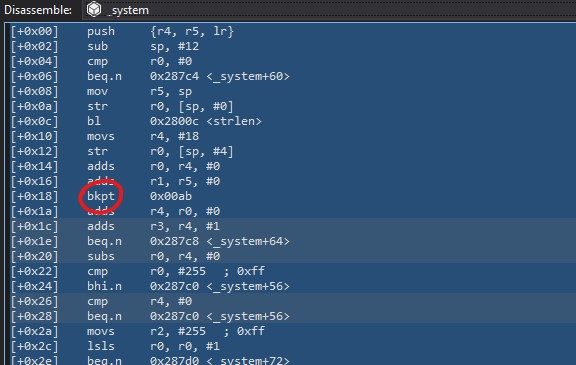…or why my application stops when disconnected from the debugger.
As you can tell from the image, I’ve been bitten badly by semihosting before.
What is ARM Semihosting?
Semihosting is a mechanism that enables code running on an ARM target to communicate and use the Input/Output facilities on a host computer running a debugger.
To put it simply, it lets you use printf, scanf and other syscalls on a target where the host acts as the ‘system’ in those calls. ARM Semihosting can be useful when other avenues of troubleshooting are difficult.
Why is it a pain
The culprit:
BKPT 0xAB
ARM processors use the BKPTinstruction on the Cortex M0, M0+, M1, M3, M4. M7 and on others the SVC instruction (previously SWI). Now the implementation of BKPT is - when the instruction is encountered, the CPU halts and waits for the host to respond.
When the host does not support semihosting, or there is no debugger connected - that’s the end of the line.
How to remove Semihosting
You may not be intentionally using Semihosting, but your toolchain might be building with Semihosting. Here’s what to look for:
-
Linker flags should be
--specs=nosys.specsand not–specs=rdimon.specsnosys = no POSIX calls, so if your build fails you’ve got some work left. If you were already building with
nosys, and this doesn’t help, read on. -
Compile this (not for ARM, for x86!), and replace
g++orldwith it.#include <iostream> using namespace std; int main(int argc, char** argv) { for (int i = 0; i < argc; ++i) cout << argv[i] << " "; return 0; }Your build script may be responsible. Replacing the compiler with this dummy executable which just prints out the input arguments is helpful in troubleshooting it. Make sure that at no point is
rdimon.specsever mentioned -
Check your source for a call to
initialise_monitor_handles(check your startup files as well) - this is specifically for trigering RDI -
Implement dummy versions of
int _write(int file, char *ptr, int len); int _write_r(struct _reent *r, int file, const void *ptr, size_t len); -
Check stacktraces for any call using
printfwith semihosting disabled (this should trigger a trap) -
If using VisualGDB, install the Advanced Semihosting and Profiler framework and select ‘ignore semihosting calls’
-
Check dissasembly of syscalls (
_write, _system, _start...)

Track down the sources of the syscalls. Try replacing libc or newlib with another copy.
-
Trust nothing. Not even the the C runtime. Versions of
crt0.swithBKPTin them have been shipped.Replace
cortex_m*/crt0.oin your toolchain with one from another version of the toolchain or from another vendor’s. It shouldn’t matter. -
Disassemble and repeat until you find the call responsible
-
If all else fails, toss everything in the fire and start over
Last modified on 2019-10-12
Comments Disabled.